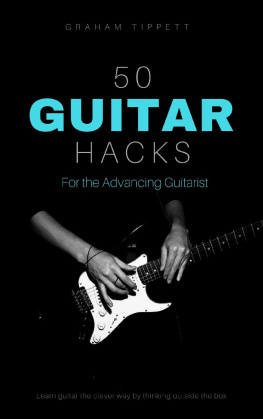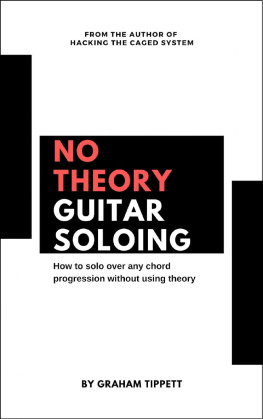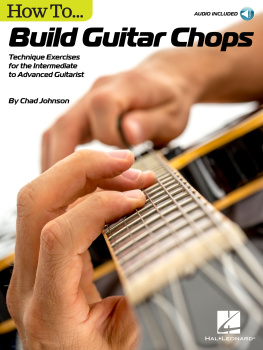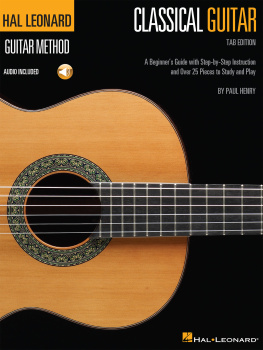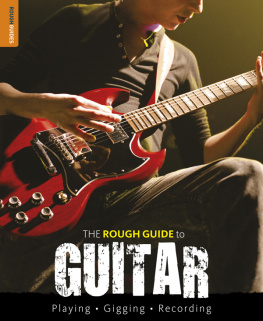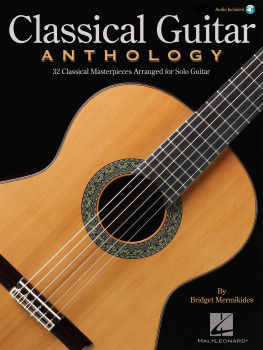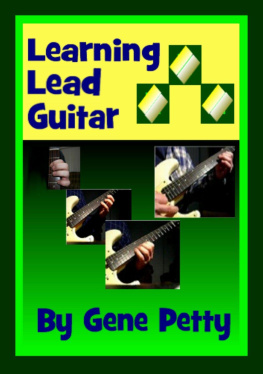Graham Tippett - 50 Guitar Hacks: For the Advancing Guitarist
Here you can read online Graham Tippett - 50 Guitar Hacks: For the Advancing Guitarist full text of the book (entire story) in english for free. Download pdf and epub, get meaning, cover and reviews about this ebook. year: 2020, publisher: Unlock the Guitar, genre: Home and family. Description of the work, (preface) as well as reviews are available. Best literature library LitArk.com created for fans of good reading and offers a wide selection of genres:
Romance novel
Science fiction
Adventure
Detective
Science
History
Home and family
Prose
Art
Politics
Computer
Non-fiction
Religion
Business
Children
Humor
Choose a favorite category and find really read worthwhile books. Enjoy immersion in the world of imagination, feel the emotions of the characters or learn something new for yourself, make an fascinating discovery.
- Book:50 Guitar Hacks: For the Advancing Guitarist
- Author:
- Publisher:Unlock the Guitar
- Genre:
- Year:2020
- Rating:3 / 5
- Favourites:Add to favourites
- Your mark:
- 60
- 1
- 2
- 3
- 4
- 5
50 Guitar Hacks: For the Advancing Guitarist: summary, description and annotation
We offer to read an annotation, description, summary or preface (depends on what the author of the book "50 Guitar Hacks: For the Advancing Guitarist" wrote himself). If you haven't found the necessary information about the book — write in the comments, we will try to find it.
50 Guitar Hacks: For the Advancing Guitarist — read online for free the complete book (whole text) full work
Below is the text of the book, divided by pages. System saving the place of the last page read, allows you to conveniently read the book "50 Guitar Hacks: For the Advancing Guitarist" online for free, without having to search again every time where you left off. Put a bookmark, and you can go to the page where you finished reading at any time.
Font size:
Interval:
Bookmark:
Contents
The Advancing Guitarist faces many challenges on the instrument, yet it is one of the most exciting periods in a players development. This book features hacks, mini-lessons, insights, tricks and tips to push you past your new-found comfort zone and make real progress on the instrument. You will reach many plateaus as you progress on guitar, and these are fantastic opportunities to do something different, and to learn something new while deepening the knowledge youve already acquired. This book provides solutions to many of the issues faced by guitarists on the intermediate plateau, those stuck in a rut, or those simply wishing to break into advanced territory on the instrument. I hope to be a facilitator on this journey, and help you get to where you want to be with your guitar playing.
To your best playing yet,
Graham
www.unlocktheguitar.net
I was never obsessed with playing fast, but I thought it would be interesting to learn the techniques and the ins and outs of picking and pick control. It seems that everyone gets hold of these tapes (DVDs nowadays) of players like Yngwie Malmsteen, Paul Gilbert, Michael Angelo Batio and so on, and attempt the monster runs they see their heroes knock out like picking machines. This is all well and good, but wouldnt it be more useful to learn the techniques or practice runs they used to do to get to that point? To be able to copy those licks, you need to have already developed your own speed techniques. The (slightly ironic) problem is that most guitarists are watching these tapes in the hopes of acquiring those very techniquessomething thats rarely explained.
In the case of Michael Angelo Batio, I was watching an interview where he demonstrated a run he used to do when developing his speed technique. I was surprised to see that it contained very few notes and was just basically crossing to the adjacent string at high speed. If you think about it, copying a monster lick that crosses the whole fretboard, or running up and down three-octave scale patterns, involves way too many factors such as pick control, changing strings, pick direction etc. that are far easier to get under control by restricting your speed practice to a sequence that just involves the fundamentals of speed playing on two adjacent strings: accurate picking and the ability to change strings easily. These movements can then be expanded to other strings when youve built up speed and control on two strings. In this way youre almost retracing the steps of speed players in order to construct your own fast playing technique.
What to do: Find a repeatable sequence of notes on two adjacent strings that involves either alternate or economy picking as well as string changing and practice it to death. When you have it under control, and can play it fairly fast and comfortably, expand it across the fretboard and into those monster patterns.
Most guitarists reach this wall at some point: theyre stuck in minor pentatonic/blues scale based playing, and are bored to tears of it. You may think the next thing to do would be to learn some theory, or venture into the dreaded modes, but wait! Pentatonic scales are used in all kinds of music, even jazz! If you only play and listen to four-on-the-floor rock, then you have no references outside of that i.e. you dont even know what not playing pentatonic scales is supposed to sound like, so where are you going to get your inspiration/ideas from? The man that helped me get through this stage and out the other side was John Scofield. Heres a player with rock roots who can play any kind of jazz or fusion guitar styles at the drop of a hat. Its even better if you go chronologically through his career as you can see the progression. The Uberjam albums are especially good listening as youll hear a fusion of rock, funk, and jazzand plenty of pentatonic playing.
What Im saying here is that as you develop as a guitar player, youll find youre very much a product of your influences, and these influences are your reference for phrasing, dynamics, note choice and much more besides. Therefore, if you can draw inspiration from players who are not, in this case, rock-pentatonic oriented, your ear is going to latch on to new phrasing ideas and create a reference for your own improvisation, which will then lead you to come up with more advanced phrasing ideas, and give you the impetus to study the theory behind it.
All things considered, if youre an advancing guitarist, the role of the guitar teacher in 2016 is almost redundant due to the advent of the internet. There are, of course, plenty of guitar teachers that are still teaching as if it were the mid-90s, and this is great if you rely on, or are motivated by that one-on-one attention.
If I were to have lessons again now, I would seek out a mentor as oppose to a guitar teacher. A mentor is a guide who can help the mentee find the right direction and develop solutions to playing issues. Mentors rely upon having had similar experiences to gain an empathy with the mentee and an understanding of their issues. Mentoring provides the mentee with an opportunity to think about their playing and progress. For me it would be someone whose playing I admire, and who I think would be able to provide me with the insight I won't find on the internet. They don't have to be a teacher per se, just someone who's an accomplished player, and who's willing to take the time to provide me with the insight I need to achieve my playing goals. The mentor-apprentice relationship is something that the internet can't do, other than provide the means of communication, and with the right person it can be truly inspiring.
The advancing guitarist usually has a good amount of technique, which at this point is a double-edged sword because the tendency is to go for more speed, more technique and more flash. What you should really be doing is slowing things down and becoming more melodic; you may even feel like something is missing from your improvisationsand this is usually strong melodic content. There are plenty of ways you could do this such as focusing on triads, coming up with melodies in your head and then trying to play them on the guitar, and so on. While these things are very useful, they all lack a certain dynamic which only occurs when the solo has a wider purpose, which is why I highly recommend sitting down and writing (not improvising) guitar solos for actual songs. Its only by doing this that you bring in factors such as: what the songs about, what fits the song, the right tone for the song, etc. Youll be surprised at what youre capable of when these elements come into play. The best material to use for this is own songs, or failing that someone elses. You can also find songs without solos and set yourself the task of writing the solo for that particular song. Once youve done this a few times, youll start to see more melodic ideas creeping into your improvised solos.
Guitarists tend to get fixated on box 1 of the minor pentatonic scale and milk it to death. You may know the shapes for the other four boxes, but how often do you actually use them? Box 1 is by far the most usable and instantly gratifying of the minor pentatonic boxes, so much so that it creates this phobia of using the others. This can be solved in the following way:
In Box 1 its very easy to get hold of the sound and pretty much play what you want to hear after a while. This is not so easy with the other four boxes, but what you can do is practice in the following way by simply transferring the sounds you know so well from Box 1 to the other Boxes.
Next pageFont size:
Interval:
Bookmark:
Similar books «50 Guitar Hacks: For the Advancing Guitarist»
Look at similar books to 50 Guitar Hacks: For the Advancing Guitarist. We have selected literature similar in name and meaning in the hope of providing readers with more options to find new, interesting, not yet read works.
Discussion, reviews of the book 50 Guitar Hacks: For the Advancing Guitarist and just readers' own opinions. Leave your comments, write what you think about the work, its meaning or the main characters. Specify what exactly you liked and what you didn't like, and why you think so.

